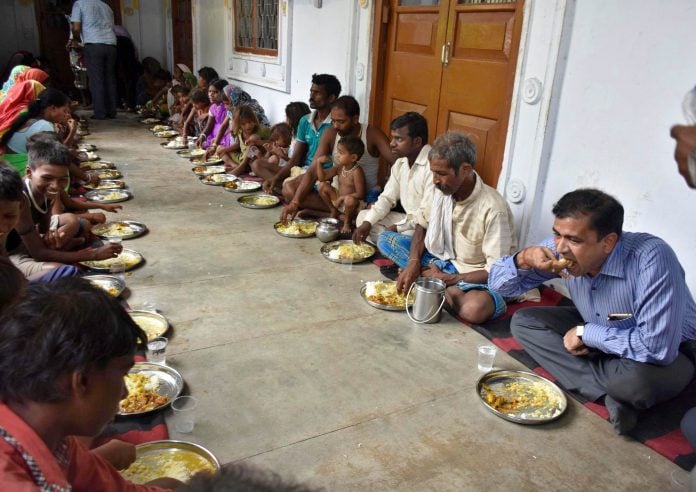
A Supreme Court bench on February 17 slapped an additional fine of Rs five lakh on Maharashtra, Delhi, Manipur, Odisha and Goa for not filing counter-affidavits to a plea seeking the setting up of pan-India community kitchens. This makes the overall fine payable by each state Rs ten lakh.
The bench, headed by Justice NV Ramana, also refused to waive the fine, as requested by several states. The attorney general, representing the centre, said an affidavit had already been filed and another would be filed soon with respect to the scheme.
On February 10, a bench headed by Justice Ramana observed that only seven states and Union Territories (UTs) had filed affidavits. These are: Andaman and Nicobar Islands, Punjab, Karnataka, Uttarakhand, Jharkhand, Nagaland and Jammu and Kashmir. The bench ordered that Rs one lakh be imposed on states which had failed to submit their replies but were filing it within 24 hours and Rs five lakh on those which had failed to submit their replies even after 24 hours.
The fines were imposed for non-compliance with a September 2, 2019, order which had directed them to file their replies.
Petitioners Anun Dhawan, Ishann Dhawan and Kunjan Singh told the apex court that the “Right to Food” was a fundamental right which was well-recognised under national and international laws as it protects the right of people to access food and feed themselves. They said that the right to food is interlinked with the right to life and dignity as envisaged in Article 21 of the Constitution and therefore, it requires that food be available, accessible and adequate for everyone without discrimination or inequality. The lack of accessibility of food with adequate amount of nutrition would be a gross violation of Articles 14, 21, 38, 39, 47 and 51(c) of the Constitution. They contended that the Supreme Court from time to time had held that the right to life includes the right to live with dignity and all those basic rights which go along with it, including the right to food.
The petitioners also cited several important cases including Francis Coralie v. Union Territory of Delhi and Paramanda Katara v. Union of India. Strong reliance was also placed on the judgment delivered by Justice PN Bhagwati in Kishen Pattayanak and Ors. v. State of Orissa, wherein it was held: “No one in this Country can be allowed to suffer deprivation and exploitation particularly when social justice is the watchword of our constitution.”
The petitioners also mentioned People’s Union for Civil Liberties v. Union of India & Ors, 2013, wherein the apex court had directed all states and UTs to implement various food-related schemes.
Reference was also made to state-funded community kitchens being run in Tamil Nadu (Amma Unavagam), Rajasthan (Annapurna Rasoi), Andhra Pradesh (Anna Canteen), Karnataka (Indira Canteen), Odisha (Ahaar Centre), Jharkhand (Mukhyamantri Dal Bhat) and Delhi (Aam Aadmi Canteen) which serve meals at subsidised rates under hygienic conditions.
They contended that all these community kitchens were established with the object of combating hunger and malnutrition in India. They said that “the rationale behind Amma Unavagam scheme is akin to soup kitchen of the US and Europe to feed the poor by serving a limited menu of nutritious cooked food at below the market price”. These soup kitchens are staffed by voluntary organisations from churches or community groups. They further said that these state-funded community kitchens would not only combat chronic hunger and malnutrition problems in India but would be a great tool to provide employment as well.
One of the suggestions of the petitioners was that such community kitchens could be managed either with state funding or public-private partnership with funding a part of corporate social responsibility.
The petitioners also relied on several reports to show that malnutrition and hunger were soaring at an alarming rate in the country. The petition stated that “it has been reported in 2017, by the National Health Survey (NHS) that approximately 19 crore people in the country are compelled to sleep on empty stomach, every night. Moreover, the most alarming figure revealed is that approximately 4,500 children die every day under the age of 5 years in our country resulting from hunger and malnutrition, amounting to over 3 lakh deaths every year owing to hunger of children alone. Additionally, it has been reported that 7,000 persons (including children) die of hunger every day and over 25 lakh persons (including children) die of hunger annually”.
The Global Hunger Index 2018 report prepared by Concern Worldwide and Welthungerhilfe ranked India at 103 out of 119 countries. India scored 31.1, indicating that it suffers from a level of hunger that is critical and serious. In addition, the Food and Agriculture Report, 2018 stated that India houses 195.9 million of the 821 million undernourished people in the world, accounting for approximately 24 percent of the world’s hungry.
They said that in spite of having a plethora of schemes and programmes to eradicate the issues pertaining to hunger, malnutrition and food security, the desired result was a distant reality. This is because these schemes were ridden with problems and the country was still grappling with them on a large scale.
Their plea to the Supreme Court was:
–To direct the chief secretaries of all states and UTs to formulate a scheme for the implementation of community kitchens and to further ensure that no person sleeps on an empty stomach.
–To direct the National Legal Services Authority to formulate a scheme to further the provisions of Article 51A of the Constitution in order to mitigate deaths resulting from hunger, malnutrition and starvation.
–To direct the central government to create a national food grid for those beyond the scope of the public distribution scheme.
The matter is listed for further hearing on April 8.
Lead Picture: UNI

